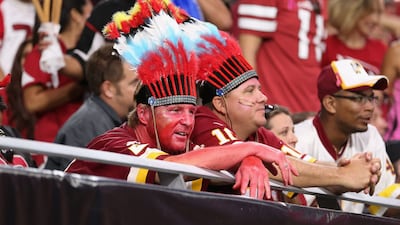After decades of being criticised for having an offensive and racist team name, Washington’s NFL franchise will now be known as the Washington Commanders, a sharp departure from the previous name, Redskins, which Native American advocates and experts have long criticised for being a “dictionary-defined racial slur”.
It might be easy to dismiss the name change as a superficial attempt to be politically correct, and make no mistake, some pundits will try to use the name change as yet another example of "cancel culture" going too far, but those pundits couldn’t be more wrong.
As a social media editor, I can hear the reactionary criticisms before they start. “Surely there must be bigger things to worry about besides team logos and names”, some might say. “Aren’t people easily offended by everything these days?” others will write. It is important to note, however, that this is more than just an issue of whether or not a logo is offensive. It is also more than just an attempt to maximise merchandise sales and minimise controversy.

This is about an ongoing conversation in the US, and frankly, around the world about how we can make sure that in sports, everyone can be comfortable and strive to be better. The continued dialogue might be difficult at times. Nobody likes to admit that they have helped perpetuate stereotypes by wearing a shirt with the symbol of their favourite team that has been deemed racist and offensive. But that uncomfortable realisation happens to be the whole point.
How can we ratchet up our society and make it more inclusive? Some might say the best way to do that is through legislation, but that is not always the case, in fact, far from it.
Many of the biggest changes in the world can come about through music, film, and yes, athletics. Regardless of what sport you enjoy, a lot of the excitement comes from the pursuit of physical and mental excellence. That pursuit is something that strikes a chord with all of us. It is part of our common humanity. Why taint it with an offensive mascot or name?
Also, if sport is truly about improving ones performance and seeking the highest possible sense of physical enlightenment, then shouldn’t the names and logos be a part of that? I think so.
Of course, nobody is perfect. A word or image that might be absolutely fine today may very well be a source of controversy tomorrow. There are no easy answers sometimes when this takes place, but the world is a better place when such controversies are addressed.
The most recent example of this would be the circumstances surrounding the University of Notre Dame, known for their teams being referred to as the "Fighting Irish". That name and logo, portraying a person wearing green, seemingly spoiling for a fight, was recently ranked among one of the most offensive mascots in US college football, according to the "Quality Logo Products Blog".
Notre Dame, however, was quick to point out, that many Irish Catholics have active roles working for and attending the university, while also noting that the "Fighting Irish" moniker was chosen by a university president of Irish descent. That is a stark contrast to the various team names based on Native Americans, where virtually no administrators or board members are represented by those groups.
“Irish-Americans – including those at Notre Dame – again have turned back on former oppressors as a sign of celebration and triumph. In both the upraised fists of the leprechaun mascot and the use of the word "fighting," the intent is to recognise the determination of the Irish people and, symbolically, the university’s athletes,” read a statement issued by the university.
That, right there, is a stirring statement and it sums up why these name changes shouldn’t be overlooked. Will the university's words withstand the test of time? We will have to wait and see, but the world is a better place now because of them.
Despite what the anti-political correctness crowds may claim, these arguments over team names and mascots are definitely worth having. They make us more thoughtful, and with that, we all win.


